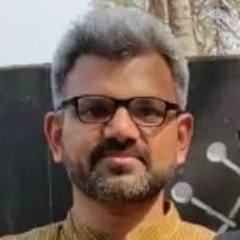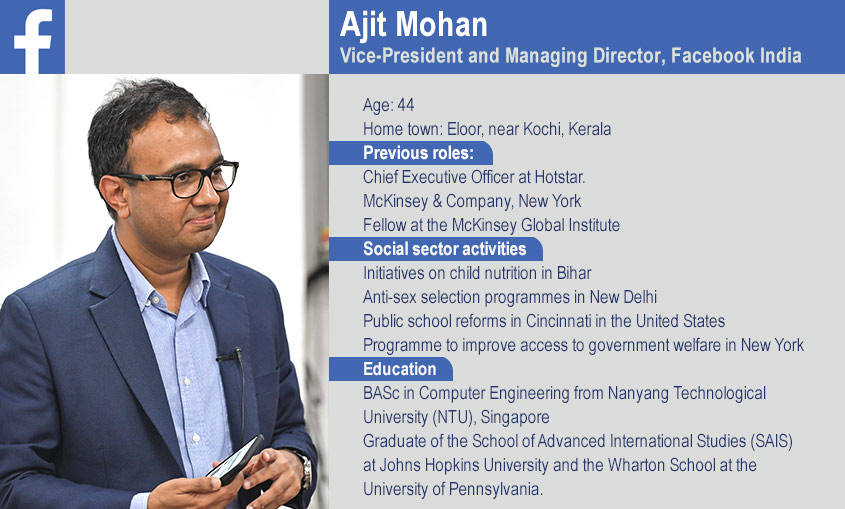Up close with Facebook's India head Ajit Mohan: 'Gender equality crucial in a sustainable internet economy'

Mail This Article
Kochi-born Ajit Mohan took his first-ever flight in 1993. The 18-year-old was among a group of Indian students who received scholarships to study in Singapore. The flight literally took off the career of the bright, small-town boy who till then lived in the Fertilisers and Chemicals Travancore Limited (FACT) neighbourhood in Eloor.
After completing his BASc in Computer Engineering from the Nanyang Technological University, he joined the School of Advanced International Studies (SAIS) at Johns Hopkins University and the Wharton School at the University of Pennsylvania. Later, he worked with reputed international companies. Ajit, 44, joined as the managing director and vice-president of Facebook in India nine months ago.
In an hour-long interaction with journalists from the Manorama group in Kochi, he delved into measures taken by Facebook to check the spread of misinformation, Facebook's investment in tech startups, challenges of building a strong internet economy, privacy concerns on social media, gender disparity and memories of his life in Kerala.
Edited excerpts:
Facebook has begun to invest in tech startups in India. What are your selection criteria?
In June this year, Facebook made its first minority investment in the world in a company called 'Meesho'. It is a social-commerce company, which leverages friends and families where people can pitch a product to their friends and determine the price. If they agree to the deal, then the fulfilment is done by Meesho at the back.
The company brought 200,000 female entrepreneurs – all of them are first time business owners – online. Its model is quite different from the traditional e-commerce model.
We would like to associate with startups that build tech capacity, impact economic growth, create jobs and improve women's participation online.
Why are you focussing on women's participation online?
The transformation of internet economy in India has been dramatic in the past three years. No country has seen such an increase in the number of 4G users – from 30 million to 400 million – in a short period. It set the stage for an internet economy that both the government and private companies have been looking for. Gender equality is crucial in a sustainable internet economy. The percentage of women online users at present is somewhere between 30 and 35%. We want to get that number closer to 50% to keep the economy sustainable.
Do you think Facebook has reached a saturation point in India?
I don't think so. The Facebook's family of apps has more than 325 million users in a month. WhatsApp has more than 400 million users a month. With Facebook App, Instagram and WhatsApp, we are growing really fast. We engage with people everyday and the numbers tell us that our growth continues. We benefited from the dramatic transformation of 4G. Now, the new internet economy is actually allowing us to improve the entrepreneurial activity in the country and Meesho is just an example for that. All the building blocks of the internet economy have started to come together only now. Far from saturation, we are in the beginning of putting the building blocks of the internet economy together.
What are the challenges you expect while putting together these building blocks of internet economy?
The major material challenge is to provide access to different internet services for women. We have seen women express concerns about safety and privacy. They are afraid that if they come online their privacy will be compromised. Facebook is working to address such concerns. One plan is to launch profile lock to keep users' profiles secure. It is in the early stages of testing. We want women to use internet with the same freedom as that of men.
Facebook users have been raising privacy concerns, especially after the Federal Trade Commission in the United State fined Facebook $5 billion for privacy violation in August this year. How are you addressing such concerns?
FB is just 15 years old. Most of the big tech companies in the world have happened in the last 20 to 25 years. We had a massive period of innovation. Since the domain was new, no one had a clear idea about the rules of the internet. Facebook always treated privacy concerns seriously. Conversations and engagements are happening now. Rules are being drafted and ideas are being put forward. We articulate that privacy is at the heart of company's philosophy.
Do you think that Indians are less concerned about privacy?
I don't think so. When we think about privacy, we apply the same guidelines and standards in India and US. It is a global approach.
How are you planning to check the spread of misinformation in your platforms?
We are very much concerned about the spread of misinformation. One of the programmes we run on the FB App is the third party fact-checking. In India, we run one of the largest fact-checking programmes in the world. We have nine fact-checkers working on 12 languages. We lean on independent fact-checkers certified by the International Fact-Checking Network, who will monitor the FB App and alert us when they find misleading content. Then we will limit the distribution of the inappropriate content.
We have advanced automation and Artificial Intelligence algorithm to check content that violates the community content policies. Upon detection, the content in question will be blocked from distribution even before they actually come on to the network.
At WhatsApp, our approach is a bit different. WhatsApp is private encrypted medium, where we don't get to see the content (On the contrary, in Facebook we are able to see the content). We have reduced virality by limiting the number of forward messages to five. The innovation came in India. It prevents misinformation going viral. It also limits the spread of good content. We believe it is a responsible thing to do.
We are planning to constitute an independent board where users get the opportunity to raise issues on fact-checking. It is still on the thinking phase.
FB invests heavily in AI. How do you plan to monetize?

Artificial Intelligence is at the core of FB. We don't think it should be monetized. We look at AI fundamentally as building capacity that influences our products across the board. Thanks to the massive investment in AI over the past four years, we now have the ability to block content even before they were distributed.
When will you launch Whatsapp Payments in India? What are the opportunities it offer?
We have agreed to payment localization. We are now waiting for the approval from the regulatory body.
We are very much excited about the opportunities it offer. It will further the financial inclusion agenda of the government. WhatsApp Payments will help financial institutions to reach out to unbanked customers at a cost that is sustainable. It is difficult for the banks to put a branch in every part of India. But with a vehicle like Whatsapp, they can actually make a materiel difference to financial inclusion.
FB is now tying up with big sports associations. For example, you have started Spanish football league matches. Is it a change in strategy?
We carry all kinds of contents. The bodies that run La Liga and cricket in India believe they could increase engagement with their fans by partnering with FB. We just announced a deal where we have exclusive rights for clips associated with International Cricket Council (ICC) events between now and 2023, including the cricket World Cup. The ICC sees it as an opportunity in its next step of innovations. People come to our platforms everyday because of the innovations we are charting.
You built the video-streaming platform Hotstar when you were with Star India? How big was the innovation?
For me, the biggest takeaway was it offered a fundamentally innovative model for traditional media companies to engage with the new world by transforming into a big product and tech company.
The growth in television viewership in North America and Europe happened in the backdrop of second and third TV sets in the same house. It was pretty clear that it would not happen in India for a while, and we know that the second and third screens in India was going to be mobile screens. That was the inspiration for building a service with mobile at the heart of it. And I transformed the content company to a product and tech company. We also recognised the power of cricket to fuel the introduction of the new content. The platform was built to serve cricket. Millions of users made use of it.
Will you please throw light on your life in Kerala and your life as student?
I grew up in Eloor in Kochi. My parents still live there. I went to a small school in Udyogamandal when my father worked in the Fertilisers and Chemicals Travancore Limited (FACT). I spent 18 years in Eloor before I went to join undergraduate course in Singapore. I always love to come back to Kochi.
I am happy to see material movements in building a tech eco-system and startup movements in Kerala. It looks different when I grew up here. Kerala has always been a leader in health indicators. Its social matrices are always up.
I was part of the first batch of students who received Singapore Airlines scholarship. Till then, I grew up in a small township (in Udyogmandal in Kochi) where my classmates were my friends. I knew their families. It was a cosy world. I knew everyone and everyone knew me. I barely travelled before that. I never left the country. The first flight I took was from Madras (now Chennai) to Singapore. I arrived at a place that is diverse and multi-cultural. A year later, I ran for the students' union at Nanyang Technological University (NTU) and I got elected. I assume I was the first foreigner to get elected to the students' union there. I was interested in public policy. The election was a lot less boisterous than the polls in Kerala. The scholarship set me up to live in a world of diversity.



